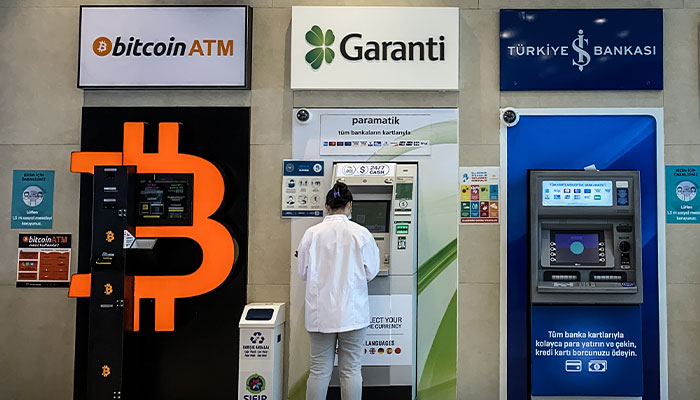The crypto-sceptic and crypto-fanatic camps aren’t entirely divided along generational lines. But it’s impossible not to notice the surge of young people investing in the stock market and cryptocurrencies over the past few years.

My time: It’s perhaps not surprising that young people, many of whom work in the gig economy, are more inclined to invest in crypto, says Professor Servátka.
Cryptocurrencies also seem to disproportionally attract the tech crowd. Announcements about companies deciding to accept crypto as a method of payment as well as opinions of famous people generate enormous publicity and appear to move the crypto market.
I have pondered what drives people to become so emotionally invested in cryptocurrencies, significantly more so than in regular stocks. However, it does occasionally happen also in the stock market, as we have recently seen with GameStop.
Why do people buy cryptocurrencies?
Despite the name, crypto is not what an economist would consider money. Cryptocurrencies are extremely volatile and thus do not store value well. They are not universally accepted and thus not a good medium of exchange. The cost of a flat white in Bitcoin is something like 0.0001, making it hard to compare prices.
Therefore, cryptocurrencies do not fulfill the role of being a (useful) unit of account. They also do not generate a stream of income, such as rent or dividends.
So why do people buy them?
There are multiple factors contributing to the rise of cryptocurrencies. The unprecedented amount of liquidity and low interest rates we are currently experiencing bring concerns that the economy might be heading towards significant inflation. People are using their cash to purchase assets, such as real estate, stock and crypto.
The question that interests me is why millions of mostly young people now want to do the investor equivalent of spending their pay packet on lottery tickets.
The supply of Bitcoin is going to be limited but that cannot be said about the monetary supply as central banks can always print more money. Crypto might thus seem like a good option to some investors.
Another motive is speculation. As more investors purchase Bitcoin and more businesses accept it, its price goes up. Some people are buying in the hope they will be able to sell for more later on. Observing the price having gone up, many new investors do not want to miss out on this growth. Often encouraged by their peers they jump on the bandwagon, contributing to further price increase.
But there could also be other motives. For example, there are investors who use Bitcoin or other cryptocurrencies to diversify their portfolio based on their objectives and risk appetite.
Is it a lottery?
One thing everyone agrees on when it comes to cryptocurrency trading is that it’s a high-risk, and possibly high-return, game. The question that interests me is why millions of mostly young people now want to do the investor equivalent of spending their pay packet on lottery tickets that do not have an established prize.

All the rage: A Bitcoin ATM in Turkey ... it is posible that we are seeing an equivalent of the 1995-2000 dot.com bubble, says Professor Servátka.
Do young investors have a different attitude towards risk, are they less experienced, or do they have fewer investment options due to skyrocketing property prices?
As a behavioural economist, I’m not surprised that people act irrationally. Millions of Australians enter lotteries every week even though they have an infinitesimally small chance of winning the jackpot.
And more poor people buy lottery tickets than rich people. So, it’s perhaps not surprising that young people, many of whom work in the gig economy and despair of getting a foot on the property ladder, are more inclined to invest in crypto.
A tech bubble 2.0?
It is possible that we are seeing an equivalent of the 1995-2000 ‘dot.com bubble’: long story short, a new technology – the internet – was achieving mass penetration; a lot of Americans who were too young to have experienced the 1987 stock market crash thought they could get a huge return on their investment if they ‘got in on the ground floor’ by buying shares in newly launched ‘internet companies’.
Those who invested in certain internet companies, notably Amazon, did get a huge return on their investment. But, after a period where their share prices soared, many internet companies collapsed and people lost their hard-earned savings.
Hard-won investment experience
While some of those burnt by the popping of the dot.com bubble gave up investing, many continued to do so in a more sober fashion. The experimental economics research suggests that new investors who’ve never experienced the boom-and-bust pattern are prone to irrational exuberance that, sooner or later, leads them to get swept up in a bubble that inevitably pops.

Beware: Professor Maroš Servátka (pictured) says that due to their lack of fundamental value, cryptocurrencies have an element of pyramid schemes.
If you want to look on the bright side, you could say a new technology made it possible to trade stock and cryptocurrencies from the comfort of the living room and thus has led a new generation to get interested in investing and become financially literate.
- Group excursions boost happiness in older people: new study
- How athletes prepare for an Olympics without supporters
Due to their lack of fundamental value, cryptocurrencies have an element of pyramid schemes, meaning that their value will keep going up only if new crypto investors are willing to buy them despite the higher price. But what will happen if they are not?
Will the price stabilize or will it crash because the crypto holders will want to offload their holdings?
Economic experiments suggest that when it comes to bubbles, the price eventually comes down to the fundamental value, which in the case of cryptocurrency is zero.
Maroš Servátka is a Professor of Economics at the Macquarie Business School and the Founding Director of its Experimental Economics Laboratory.



